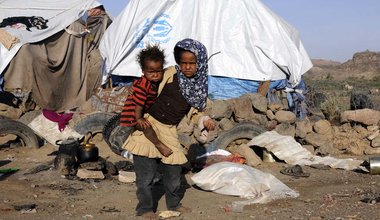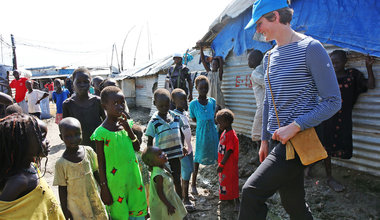‘Climate of Xenophobia’ Grips Europe on World Refugee Day
20 June 2016 | Leonard Doyle, Spokesperson of the Director General of the International Organization of Migration
As more details indicate the killing of British MP Jo Cox was motivated by her position on migrants and refugees, the United Nations is stepping up its campaign against the "climate of xenophobia" gripping Europe.
UN High Commissioner for Refugees Filippo Grandi underscored the point with Agence France-Presse on Saturday, , "Refugees... don't bring danger" but "flee from dangerous places."
He stressed that those who don't talk about the benefits of immigration but instead "stir up public opinion against refugees and migrants have a responsibility in creating a climate of xenophobia that is very worrying in today's Europe."
United Nations Secretary-General Ban Ki-moon also urged "a humane and human rights-based approach" because that's "our humanitarian imperative. It is what we must do as a human family."
Jo Cox made her mark as proudly pro-refugee and migrant and was known as one of the brightest and best of the MPs elected for the first time at last year’s UK general election.
She was vocal in calling for the resettlement of more refugees from Syria and other conflict zones, particularly unaccompanied children.
The former head of humanitarian campaigning at Oxfam, she had called repeatedly for Britain to do more to help the victims of Syria’s civil war. Her husband Brendan Cox now intends to continue with a project – which he outlined during a visit to IOM several months ago – to build an international alliance to combat anti-immigrant politics.
Brendan Cox says it is vital to learn why the far right is dominating on the migration issue.
In a paper written before his wife was killed, Cox argues that those hostile to refugees and migrants are better organised, more focused on galvanising public opinion, and better at tapping into human emotions, including over wider economic insecurities.
Cox, who has spoken extensively to campaigners, refugees and politicians across Europe to understand why populists dominate the debate on migration, warns that governments often focus on the wrong issues: “They obsess over numbers (to most people 10,000 sounds as scary as 100,000), when they should focus on reinforcing frames of fairness and order.
Doing otherwise shows “a complete lack of control heightening concern and fanning the flames of resentment.”
In conclusion, Cox writes: “There is no reason we can’t quickly shift the debate back to the mainstream and in doing so not only help refugees and migrants, but also help marginalise the resurgent populist right. To do so we need to readjust our efforts to reflect that power on this issue is with the people.”
 UN
UN







